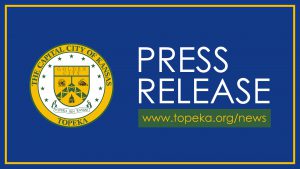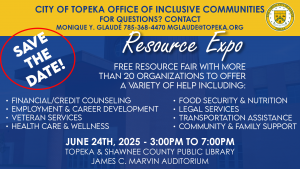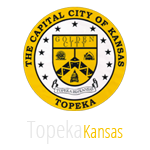Due to an HVAC issue, the Holliday Building, located at 620 SE Madison, will close today, Friday, June 27, at 12:00 p.m. We apologize for any inconvenience this may cause to residents and visitors. Staff is working with contractors to get this resolved as quickly as possible.
If you need to make a payment, the City of Topeka encourages the use of its convenient online portal, PayOnline, which allows users to pay a variety of bills under a single account. Pay Online | City of Topeka
Through PayOnline, you can manage your City of Topeka utilities account and pay your monthly bill using a credit card, debit card, or electronic check.
Please note:
• If your account is past due or your water service has been disconnected, please contact Customer Service directly at 785-368-3111 for assistance.
• Customer Service Representatives are available Monday through Friday, from 7:30 a.m. to 5:30 p.m
We appreciate your understanding as we work to resolve this issue.

The City of Topeka is announcing upcoming changes to Downtown parking rates and regulations following approval by the Governing Body during its June 10th meeting. These changes are part of a broader effort to create consistency across the parking system, invest in infrastructure, and improve accessibility for those who live, work, and visit Downtown.
In the coming weeks, Parking Administration staff will begin outreach to current garage and street permit holders to explain pricing updates. Signage, online resources, and other communications will also be used to help downtown visitors navigate the changes.
“We’re committed to maintaining an affordable and accessible parking system for everyone who visits, works, or lives in Downtown Topeka,” said City Manager Dr. Robert Perez. “These updates are designed to simplify our parking structure while supporting reinvestment in our facilities.”
Key Parking Changes
Effective September 1, 2025:
• Monthly parking rates will increase from $67.75 to $74.00 at the following garages:
o Centre City Garage
o Crosby Place Garage
o Townsite Garage
• 10-hour meter rates will increase from $0.50 to $1.00 per hour, creating a uniform hourly rate for on-street meters.
• 10-hour permits will increase from $44.00 to $74.00 per month
Effective January 1, 2026:
• Monthly parking rates will increase from $67.75 to $74.00 at:
o 512 Jackson Garage
o Park N Shop Garage
• The 9th Street Garage monthly rate will increase from $47.43 to $51.00
• Yellow hoods will be removed from the 100 blocks east and west of Kansas Ave. Between 6th & 10th Streets. These spaces will become 2-hour metered parking at a rate of $1.00 per hour. Some areas will retain meters, while others will feature signage with payment options via mobile app.
• The Coronado and Uptowner garages will increase to $74.00 per month following the completion of necessary structural repairs. A 60-day notice will be provided once a completion date is determined.
Please Note:
• Hourly garage rates will remain at $1.00 per hour, with free parking during evenings and weekends
• Parking on Kansas Ave. will remain free with a two-hour daily time limit
• More 4-hour free parking spaces will be added on the outskirts of Downtown to support longer visits and employee parking.
The Topeka Police Department will be hosting car stop training to local high school students and their parents this summer. Students will learn what to do if pulled over by a Topeka Police Officer. Interactions with the police can be a stressful and intimidating experience for community members. The training sessions will allow students to interact with instructors and experience what a car stop might look like, both from the driver’s perspective as well as the Officer’s in both a classroom setting as well as a mock car stop in the parking lot.
There will be two sessions available for students and their parents to sign up.
- Saturday June 21st at Crestview Community Center, 4801 SW Shunga Drive, from 10AM to 1PM
- Saturday July 19th at the Law Enforcement Center, 320 S. Kansas Ave, from 4PM to 7PM
To sign up, students and their parents may contact Sergeant Mike Burns at 785-368-2401 or mdburns@topeka.org.

The City of Topeka is excited to announce it is now accepting applications for the Lead Grant Program, aimed at making homes safer for families by identifying and addressing lead-based paint hazards. Thanks to a $4 million grant from the U.S. Department of Housing and Urban Development (HUD), the city plans to make qualifying homes lead-safe over the next four years.
This new initiative is designed to improve health outcomes for children and families by targeting older homes with known lead-based paint risks. Household must have one or more children under the age of 6 living in the residence to qualify. The program provides substantial financial support—up to $25,000 per single-family dwelling unit from the lead grant to remove or control lead hazards for qualifying individuals.
“Through the Lead Grant Program, we’re taking meaningful steps to eliminate lead hazards in Topeka’s homes and protect our youngest residents from the long-term effects of lead exposure,” said Carrie Higgins, Director of Housing Services. “We’re grateful for this opportunity to invest in healthier futures for families across our community.”
To see eligibility requirements and to apply, click the link in the City of Topeka’s Housing Services Department. Lead Grant Program | Housing Services

The City of Topeka’s Office of Inclusive Communities invites residents to attend the upcoming Community Resource Expo, a free, one-stop-shop event featuring more than 20 organizations ready to connect individuals and families with vital services and support.
The Resource Expo will take place on Tuesday, June 24, 2025, from 3:00 PM to 7:00 PM at the Topeka & Shawnee County Public Library, James C. Marvin Auditorium. This event is designed to help residents access a wide variety of essential resources in one location.
Attendees can expect to find information and assistance in areas including:
• Financial and credit counseling
• Employment and career development
• Veteran Services
• Health care and wellness
• Food security and nutrition
• Legal services
• And more!
“This expo is about making it easier for Topekans to connect with the help they need,” said Monique Glaudé, Director of the Office of Inclusive Communities. “Whether you’re looking for career guidance, legal support, or wellness resources, this event will bring service providers directly to you.”
Save the date and join us on June 24 to explore the many resources available in our community.
Questions? Contact Monique Glaudé at 785-368-4470 or mglaude@topeka.org.

The City of Topeka is excited to announce the launch of the Changing Our Culture of Property Maintenance Yard of the Month Program, beginning in June 2025. This initiative recognizes residents who take exceptional care of their yards, enhancing curb appeal and fostering a sense of
community pride.
The Office of Inclusive Communities (OIC) works to strengthen community connections by supporting programs and initiatives that encourage understanding, belonging, and inclusive practices across the community.
“This program is about more than just recognizing beautiful yards, it’s about fostering a sense of pride and belonging in every neighborhood, said Director of Inclusive Communities Monique Glaudeˊ. “A well-maintained yard can uplift an entire community, creating a welcoming and inclusive environment for all residents. By celebrating these efforts, we’re reinforcing the idea that every home, no matter the size or
location, has the potential to contribute positively to Topeka’s vibrancy and charm.”
Each month, one outstanding yard will be selected and recognized for its landscaping, maintenance,
creativity, and sustainability. The winning yard will proudly display the Yard of the Month sign and
receive special recognition from the City of Topeka. The Yard of the Month program aims to inspire residents to take pride in their properties, contributing to a cleaner, more beautiful Topeka. The City encourages all residents to participate by nominating
deserving yards and maintaining their own properties with care and creativity.
To nominate a yard, visit: https://forms.gle/ZZzp9rfHrtnZhTrk8
Para el formulario en español:
https://forms.gle/GsBvF7xoeMYWzC7L6

The City of Topeka invites residents to attend a quick, 1- hour informational session to learn how to host a National Night Out (NNO) event in their neighborhood. These sessions will provide step-by-step guidance on how to receive up to $200 in stipend support and to host a successful,
community-centered event.
Attendees will learn about:
• How to apply for the NNO stipend
• What expenses are covered
• Requirements to host an event
• Ideas for fun, safe, and engaging neighborhood gatherings
Attendees can reserve to attend one of the informational sessions.
May 22 – 6:00 p.m. to 7:00 p.m.
May 23 – 11:00 a.m. – 12 p.m.
Location: City of Topeka, 620 SE Madison Avenue, 1st Floor Conference Room
“National Night Out is one of the best ways neighbors can come together, connect, and strengthen their community,” said Monique Glaudé, Director of the Office of Inclusive Communities “These informational sessions are designed to make the process simple and to ensure everyone feels empowered to host an event.”
To RSVP or to ask questions, contact Monique Glaudé at mglaude@topeka.org or 785-368-4470

The Topeka Police Department is proud to announce the launch of a new specialized initiative aimed at reducing violent crime in our city and increasing community engagement and involvement. The program, titled PACT (Police and Community Together) is built on the principle that
lasting public safety is only possible through strong, collaborative partnerships between law enforcement and the communities they serve.
To introduce this initiative and foster meaningful dialogue, the Topeka Police Department will host a community kickoff picnic on Thursday, May 22, from 6:00 p.m. to 8:00 p.m. at the Little Oakland Park, 900 NE Chester Ave.
This event is a great opportunity for residents to meet Topeka Police Chief Chris Vallejo, his senior command staff, and the dedicated officers of the PACT unit. Attendees are encouraged to share their ideas, voice concerns, and help shape the department’s ongoing strategies to address and prevent violent crime in Topeka.
The evening will include complimentary food, community resource information, and time for one-on-one conversations with staff and officers.
All members of the public are warmly invited to attend. Come out, enjoy the evening, and be part of the conversation on making Topeka safer—together.
Event Details:
What: PACT Community Kickoff Picnic
When: Thursday, May 22, 2025 | 6:00 p.m. – 8:00 p.m.
Where: Little Oakland Park, 900 NE Chester, Topeka, KS
Who: Chief Vallejo, Topeka Police Department leadership, PACT officers, and the public
Why: To elicit meaningful dialogue between the Topeka Police Department and the citizens of Topeka to
talk about crime reductions strategies and exchange information.

This month the Metropolitan Topeka Planning Organization (MTPO), in coordination with the City of Topeka, will host its second community open house and presentation on the Update of the City’s 2016 Pedestrian Plan. The plan’s goal is to continue creating safe and connected walkways between schools, parks, shopping districts, workplaces, and other popular destinations. Anyone interested in the walkability and connectivity of Topeka is encouraged to attend this open house and presentation from 5 to 7 p.m., Wednesday, May 21, at the Topeka & Shawnee County Public Library, 1515 SW 10th Ave, Marvin Auditorium, Room B. The presentation will begin at 5:30 p.m.
In this second public meeting, City staff and project professionals from JEO Consulting Group will share the results of an analysis that produced a transparent, objective, and data-driven approach to prioritizing sidewalk improvement projects, ensuring that future investments align with local goals and needs. The meeting will be an open house, with attendees visiting stations sequentially. A presentation will also be included, and seating will be arranged for attendees.
“This plan is just one piece of a more considerable effort to improve the quality of life through vibrant neighborhoods and better transportation choices for pedestrians, bicyclists, transit users, and motorists,” says Carlton Scroggins, Transportation Planning Manager.
For more information, visit the MTPO website at https://topekampo.org/pedestrian-master-plan/ or contact the City of Topeka Planning Department at (785) 368-3728.

